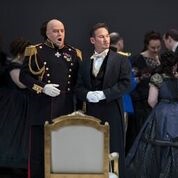
 Highly Recommended ***** There’s still the annual musical yet to go, but Pyotr Tchaikovsky’s Eugene Onegin is now playing at the Lyric Opera, and it’s the perfect conclusion to the 2016/2017 season. Unlike other shows this season, Tchaikovsky’s 1879 adaptation of Alexander Pushkin’s verse novel isn’t about magic or royalty, nor does it end with a climactic death, despite containing a fatal duel. The composer’s music never overwhelms the character-driven story, but instead serves to reinforce the tragedy resulting from a refusal to accept that “routine is the substitute God gives us for happiness,” as the opening quartet puts it.
Highly Recommended ***** There’s still the annual musical yet to go, but Pyotr Tchaikovsky’s Eugene Onegin is now playing at the Lyric Opera, and it’s the perfect conclusion to the 2016/2017 season. Unlike other shows this season, Tchaikovsky’s 1879 adaptation of Alexander Pushkin’s verse novel isn’t about magic or royalty, nor does it end with a climactic death, despite containing a fatal duel. The composer’s music never overwhelms the character-driven story, but instead serves to reinforce the tragedy resulting from a refusal to accept that “routine is the substitute God gives us for happiness,” as the opening quartet puts it.
This particular production, originally created by Robert Carsen, last played at the Lyric during the 2007-2008 season. The local version is again being directed by Paula Suozzi, but conductor Alejo Pérez, Mariusz Kwiecień in the title role, and Ana María Martínez as dueteragonist Tatiana, are new to the production. Right away, though, it must be said that lighting designer Christine Binder is also a star of the show, as her accomplishment is just as magnificent in her field as those of the actors and musicians are in theirs. Eugene Onegin opens during the fall harvest, when Madame Larina (Katharine Goeldner) and her servant, Filipyevna (Jill Grove, really making the most of this role) are peeling potatoes in the forest. But despite the open location, set designer Michael Levine’s blank, massive walls create a feeling of claustrophobia. Offstage, Tatiana and her sister, Olga (Alisa Kolosova), sing a love song. The older women comment to each other that a long time ago they sang the same way, but now they work so hard they hardly care that they’ve given up their dreams.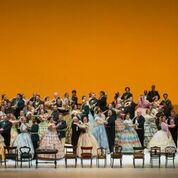
Olga is fortunate to have a boyfriend she actually likes, the poet Vladimir Lensky (Charles Castronovo). He invites over his new friend, Eugene Onegin, who has left his home in the capital to take care of a sick relative in this backwater. Tatiana is smitten at once and Eugene remarks to himself that he finds it odd Lenksy has chosen the mundane and somewhat annoying Olga over the intriguing Tatiana. We don’t get to hear most of their initial conversation, though. Tchaikovsky has Eugene and Tatiana go offstage while Lensky sings of his love to Olga, but in Carsen’s version, Olga is more interested in scraping the last bit of jam out of a jar than in listening to most of his verses. She’d boasted earlier to Tatiana that everybody loves her and life will always be kind to her. Hearing someone else tell her what she already knows apparently isn’t that interesting. Or perhaps, her crudeness actually shows her to be much more sensible.
We get to know Tatiana during a scene that night in which she writes a love letter to Eugene. In an opera made up of mostly short scenes, this one is stretched out, as Martínez delivers an aria in which Tatiana indulges in notions of courtly love which were antiquated even in the 1820s, has enough self-awareness to rebuke herself, expects to be rejected, and then resumes writing anyway. Tchaikovsky mostly used the lower register of the voice for this opera, and Martínez’s warble on her low notes pulls on the heartstrings, as does her acting. She is like Romeo and Juliet blended into the same character.
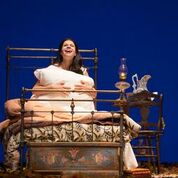 Kwiecień starts coming into his own in the following scene, as the story shifts to focus on him. Eugene holds Tatiana at a distance, telling her that he is not interested in marriage or anything else she associates with love, and if they’re not compatible, she’d best not pursue him. Despite Tatiana’s humiliation, this is exactly the right thing for him to do, but he gets punished for it anyway when rumors begin flying around the little town that he’s a rake. Irrationally blaming Lensky for this, Eugene flirts with Olga until Lensky takes offense, leading him to challenge Eugene to a duel. This mid-act finale ends with Lensky’s declaration V vashem dome, but it’s a musically stand-out moment because the large chorus allowed Tchaikovsky a rare chance in this work to utilize overwhelming dramatic sound.
Kwiecień starts coming into his own in the following scene, as the story shifts to focus on him. Eugene holds Tatiana at a distance, telling her that he is not interested in marriage or anything else she associates with love, and if they’re not compatible, she’d best not pursue him. Despite Tatiana’s humiliation, this is exactly the right thing for him to do, but he gets punished for it anyway when rumors begin flying around the little town that he’s a rake. Irrationally blaming Lensky for this, Eugene flirts with Olga until Lensky takes offense, leading him to challenge Eugene to a duel. This mid-act finale ends with Lensky’s declaration V vashem dome, but it’s a musically stand-out moment because the large chorus allowed Tchaikovsky a rare chance in this work to utilize overwhelming dramatic sound.
It is during the duel that Binder’s lighting and Levine’s set and costumes create their most chilling stage picture. Castronovo and Kwiecień are excellent at channeling their characters’ pride, dismay, and grief into their duet, during which Binder keeps them isolated in tightly-drawn circles of light. Although the visual elements climax in this scene, the actor-singers continue on the journey Tchaikovsky’s music has expertly laid out for them. Late in the show, Dmitry Belosselskiy appears as Prince Gremin for an aria about the joys of marriage, the dramatic irony of which is painfully raised by how sincere and oblivious the composer has made it sound. For Prince Gremin’s wife is none other than Tatiana, and she does not return the feeling.
People familiar with Tchaikovsky through his ballets and orchestra pieces may not have known how readily he was able to incorporate the human voice into his compositions. Though the cast is drawn from all over the world, the Russian language adds a distinct quality to the music, which specifies the social pressures at work in the story even as it makes the characters’ feelings plain for all to hear. The story’s realism makes it thematically similar to the work done a few decades later by Anton Chekov and Konstantin Stanislavsky to make theatre psychologically accessible. It is therefore demanding of the singers’ acting ability while also providing them with clearer guidance than some of the older operas, which were intended for styles of acting which have died out or become ossified and thus require reinterpretation on contemporary stages. Carsen’s production was rightly adored by the many Russian fans at the opening, but the skills of all the artists involved allow it to transcend national boundaries while retaining the stamp of the story’s origin.
Running time is three hours and ten minutes with one intermission. Performances are as follows:
Sat, Mar 4: 7:30pm
Wed, Mar 8: 7:30pm
Sat, Mar 11: 7:30pm
Tue, Mar 14: 7:30pm
Fri, Mar 17: 7:30pm
Mon, Mar 20: 7:30pm
Performances are at the Civic Opera House, 20 N. Wacker Drive, Chicago. The Lyric offers parking deals with Poetry Garage at 201 W Madison St. if inquired about in advance. Tickets are $17-299; to order, visit LyricOpera.org or call 321-827-5600.
To see what others are saying, visit www.theatreinchicago.com, go to Review Round-Up and click at “Eugene Onegin.”

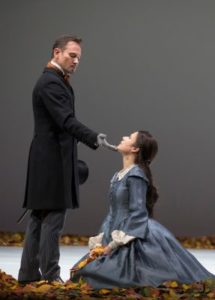

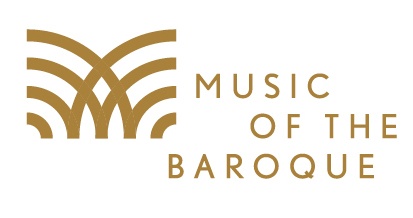

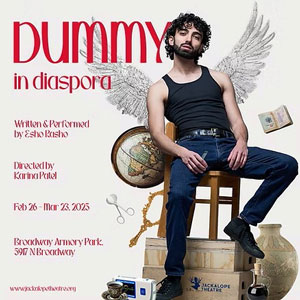

More Stories
“Dummy in Diaspora”
“The Magic School Bus: Lost in the Solar System”
“February House” reviewed by Julia W. Rath